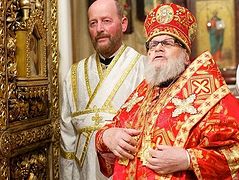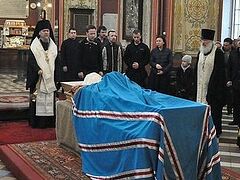 Cornelius (Jacobs), Metropolitan of Tallinn and All Estonia For a long time I dreamed the same dream, in which I was carrying my little daughter Dasha1 in my arms. She was light, almost weightless... Gasping because of a quick step, I was endlessly wading with her through some motionless black mist and, overcoming space with difficulty, constantly straining my eyes, trying to see at least a gleam of light... “Lord, where am I running?!”
Cornelius (Jacobs), Metropolitan of Tallinn and All Estonia For a long time I dreamed the same dream, in which I was carrying my little daughter Dasha1 in my arms. She was light, almost weightless... Gasping because of a quick step, I was endlessly wading with her through some motionless black mist and, overcoming space with difficulty, constantly straining my eyes, trying to see at least a gleam of light... “Lord, where am I running?!”
Waking up in the morning, I would realize that the dream was no different from the reality, although my daughter had already grown up—she was sixteen years old. The dream subconsciously and stubbornly reminded me of the only fact that I was “carrying my sick child in my arms” for the third year. The doctors were unable to help her: all the methods of treatment and new drugs only led to an obvious deterioration in the girl’s condition. Medical centers, consultations of luminaries in medicine, the search for a panacea... All this had become “an endless run in the night.”
We sometimes don’t notice that we live “without coming to our senses.” And we live this way until a mental pain forces us to move from the outwardly comfortable world into our inner world, where our meeting with God should take place.
Metropolitan Cornelius was the one who helped me understand pain with my heart, not my mind. He helped me accept a new reality, with a desperate battle for my daughter, who from a sunny girl and winner of literary competitions suddenly turned into a disabled person.
“Your cross is your salvation! There is the Providence of God for each of us. Humble yourself. You must come to love your suffering...” This is what Vladyka told me on learning about the medical “verdict” of the S.M. Kirov Military Medical Academy in St. Petersburg.
My mind rebelled: it was difficult to fathom how one could “love” suffering! Later I came to understand that it was quite possible! “Man ascends to Heaven through sorrow and torment. Our pain and suffering are our teachers,” Vladyka would repeat. And I learned from suffering... I learned to humbly accept the hardships that had fallen to my lot, learned to forgive those who due to their weakness had abandoned me in trouble, learned to appreciate small joys and ask the question, “For what purpose?” instead of “Why?” For it was necessary for me to reconsider the vanity of the external world, which was leading me away from the feeling of Heaven. I came to understand that everything that you have can be taken away from you, but only the Heavenly Light cannot be taken away! You can only lose Heaven by doubting the Providence of God: O thou of little faith, wherefore didst thou doubt? (Mt. 14:31).
It was the exorbitant suffering of my daughter that prompted me to turn to God, the Most Holy Theotokos and the saints for help. My soul began to work to attain “the sense of Heaven.” I started to go on pilgrimages to holy places.
I recall the St. John Convent in honor of St. John of Rila in St. Petersburg, where the “pastor of Truth”, as the contemporaries of holy Righteous John of Kronstadt called him, found eternal rest. Vladyka Cornelius greatly venerated this saintly man of prayer.
I could spend only one day in St. Petersburg and needed to have time to do the main thing: to pray to St. John of Kronstadt in the lower church, or the “crypt”.
After the end of the Liturgy in the upper church—the Cathedral of the Twelve Apostles—my companion pilgrim and I with difficulty squeezed through the dense human wall and went downstairs to get to the saint’s tomb. And we suddenly heard that there would be no access to the tomb till the next day. The faithful began to disperse, and I, suffocating from the unexpected news, sat down on a bench perplexed, unsure of what I should do. Tears welled up in my eyes... Suddenly my cell phone rang: “Olga Konstantinovna, where are you now? Is everything all right? Who is crying there?” Metropolitan Cornelius wondered. The singing of the choir could be heard at that time. I joked bitterly: “It is my soul crying, Vladyko. I can’t get to Father John’s tomb.” The metropolitan replied calmly: “I bless you...”. The conversation ended. And although many people noted the power of Vladyka Cornelius’ blessing, I sighed and began to watch with a vacant look the novices cleaning the convent’s utensils. A thought flashed through my mind: “Thank God that at least I have been able to visit the holy convent.”
 A tall nun caught my attention. Easily skirting around the crowded pilgrims, she quickly walked towards us. “My dear, let’s go! I’ll take you to Father John,” she said, touching my shoulder slightly. I didn’t believe what I had heard and asked again: “Are you talking to us, mother?” She nodded her head in reply.
A tall nun caught my attention. Easily skirting around the crowded pilgrims, she quickly walked towards us. “My dear, let’s go! I’ll take you to Father John,” she said, touching my shoulder slightly. I didn’t believe what I had heard and asked again: “Are you talking to us, mother?” She nodded her head in reply.
In tears of gratitude, we stood for about half an hour on our knees at the holy tomb, lined with white marble. And Metropolitan Cornelius then said: “Father John himself called you. He certainly called and consoled you.”
Our memories very often fade emotionally and are lost, but there are images that don’t fade with time at all. Metropolitan Cornelius is one of such people. But it isn’t easy to talk about the deep spiritual world of the Metropolitan and it’s difficult to find the right words—everything seems approximate and inaccurate.
Long evenings will remain in my memory, when Vladyka, settling back a little in his arm-chair, talked slowly about human weaknesses and the power of mind, the saving power of prayer and the Orthodox faith, life and death. “The expectation of death,” he would say, “is the greatest expectation worthy of a human being. This expectation helps you purify your conscience by repentance and urges you to do good works...”
Truly, a person’s life is given sense by his death. The way we pass into eternity is very important. Our death is the crown of our life. It just so happened that my daughter Dasha and I, along with the “kind yet strict cell-attendant,” as the metropolitan called Xenia Georgievna, witnessed Vladyka Cornelius taking his last breath.
It was the Paschal season...2 On that sunny day, April 19, 2018, I was not supposed to be with the metropolitan. A discussion concerning the new issue of the newspaper was planned for the following evening. But Vladyka’s phone call changed everything. In a low voice he inquired about my daughter’s condition and learned that there had been no attacks the previous night (and they were happening every day!), Asked me to bring him the materials prepared for layout, and... to take Dasha with me. No foreboding—only joy! Paschal joy!
While drinking tea and reflecting on the fact that it is suffocating for people to live without spiritual love, Vladyka put his cup of tea aside and said thoughtfully, “Dasha, will you come to me again?” My daughter happily responded: “Dear Vladyka, I will certainly come to you many times…” “No! Just one more time!” was his answer. After a moment he had a sudden coughing fit, then rose from his seat abruptly, and leaning his hands on the edge of the table and gasping for air several times, began to sink down... An ambulance arrived quickly but it was no longer needed.
In the deep silence we gazed at the reposed Vladyka Cornelius, whose face expressed complete calmness. His lips were smiling in Paschal joy; he was contemplating the Light he had been striving for all his life.
A grateful memory... What is it like? This is just a response of a living, loving heart to ingenuous kindness, sincere compassion and prayerful help.
Gratitude doesn’t need verbal expression; true things are left unnamed. It is a state of mind, a feeling of Heaven!
According to the doctors’ verdict, my daughter was supposed to be in a wheelchair forever, but... thanks to Vladyka Cornelius and everybody else who had prayed for the sick girl, the illness abated! Today Dasha is a makeup artist and a happy fiancee. The Lord is merciful!
We will forget those with whom we once laughed, but we will never forget the one who dried our tears. The memory of Metropolitan Cornelius is the memory of my loving heart, for which there are no barriers or losses.




